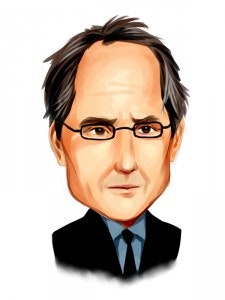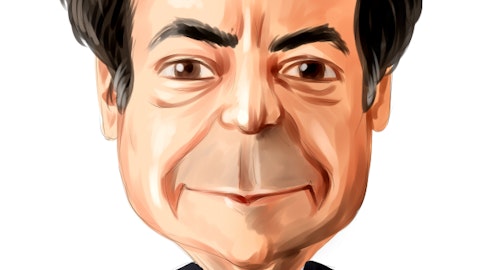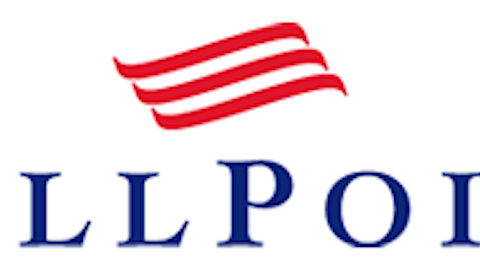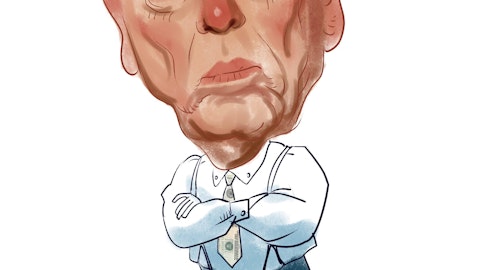D.E. Shaw & Co., LP, founded by D.E. Shaw in 1988, is a New York-based investment management firm managing over $26 billion in investment capital. The firm primarily trades using systematic and computer driven methods. Founder D.E. Shaw received his Ph.D. from Stanford University in 1980, worked for Columbia University for six years, and then left to work in computational finance at Morgan Stanley for two years. The company relies heavily on quantitative math-based techniques and computers to identify trading and investing opportunities. Below are a few of D.E. Shaw’s highest yielding dividend stocks according to the firm’s 13F filing as of the end of June. All of these companies have a dividend yield greater than 3.5%. See all of D.E. Shaw’s holdings here.
Eli Lilly & Co. (NYSE:LLY) has a dividend yield of 4.2% and engages in the discovery, development, manufacture, and sale of pharmaceutical products. The company’s top drug lost patent protection last year, and another top drug will lose patent protection in 2013. However, this has not stopped D.E. Shaw from owning the company, as well as Jim Simon’s Renaissance Technologies, who made Eli Lilly his fourth largest position by adding 23% to his stake during the second quarter of 2012. What appears to be keeping D.E. Shaw and Jim Simons’ interest is Eli Lilly’s robust pipeline of drugs, with 66 potential medicines in development. Eli Lilly has also shown strong growth prospects and expanded into Japan and emerging markets.
Dominion Resources, Inc. (NSYE:D) has a dividend yield of 4.0% and engages in producing and transporting energy in the U.S. Dominion also operates the U.S.’s largest natural gas storage system. The company has diverse business units, including regulated utilities, power-generating activities and natural gas pipeline and storage. The utility side of the business provides cash flow stability for its dividend. The company does trade out of line with the industry as far as P/E multiples, where Dominion has a P/E of 22 versus the industry average of 16.5. However, the company trades at a 15x forward P/E.
Philip Morris International Inc. (NYSE:PM) has a dividend yield of 3.5% and is engaged in the manufacture and sale of cigarettes and other tobacco products in markets outside of the U.S. The number of smokers is decreasing in Western Europe, although price increases have been able to offset any declines in revenues. Also, the growth in emerging markets for brand products should prove to boost profitability in the long run. Philip Morris is also making an effort to develop safer cigarette alternatives, which could be a big hit for the company. After a positive record of beating EPS expectations over the past year, and second quarter results that showed positive market penetration in Japan and emerging markets, many funds entered the stock, including D.E. Shaw, who increased his position by 54%. Additionally, Adage Capital Management increased their position by 40%. There are also five funds with over 7% of their holdings concentrated in Phillip Morris.
ConocoPhillips (NYSE:COP) has a dividend yield of 4.7% and operates as an integrated energy company worldwide, acting as an exploration and production company with assets in approximately 30 countries. Warren Buffet continues to own over $1.6 billion worth of ConocoPhillips’ shares, and many other notable managers added to their positions during the second quarter, including Steven Cohen and Ken Fisher. Many managers saw the May 1st spinoff of downstream operations as a positive that will free up the company to excel going forward. Relative to the industry, ConocoPhillips trades at a discount as measured by P/E and P/S multiples. The industry P/E is 9.3 and the industry P/S is 0.95, while ConocoPhillips trades at a P/E of 6.6 and a P/S of 0.3.
Johnson & Johnson (NYSE:JNJ) has a dividend yield of 3.6% and is a diversified healthcare company that operates in the pharmaceutical, medical device and consumer products segments. Insider sales have outpaced insider purchases of late, but this has not stopped D.E. Shaw from adding 72% to his position during the second quarter of 2012. Johnson & Johnson has managed to deliver solid results despite slow-growth in Europe. Management has recently revised EPS guidance upwards and analyst estimates puts EPS growth to $5.07 for 2012 and $5.46 for 2013, versus $5.00 in 2011.
While hedge fund sentiment isn’t an end-all-be-all indicator, it does provide individual investors with a starting point for their own research. Empirical studies have shown that those who follow hedge funds’ holdings can beat the market by up to 7% a year. To learn more about this phenomenon, continue reading here.





